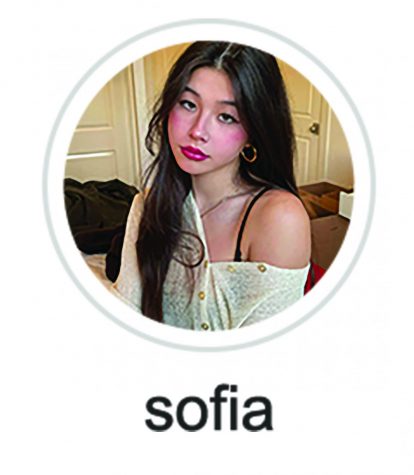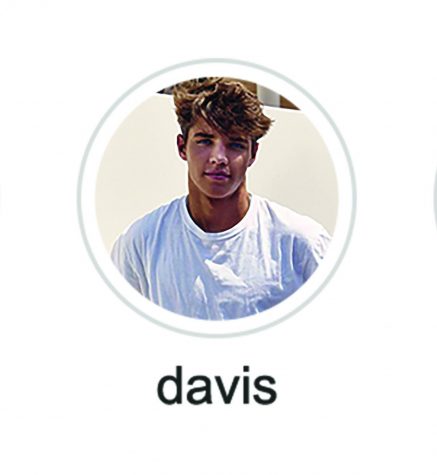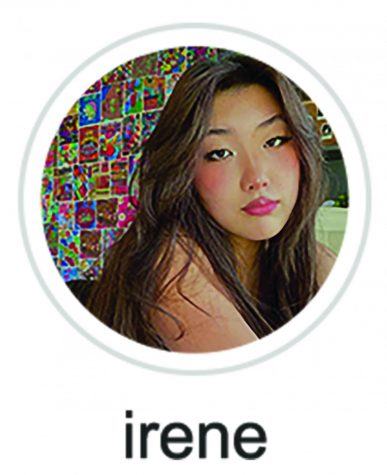Unfiltered
Students reflect on their experiences as social media influencers and the consequences of internet fame.
August 30, 2021
Staring in the mirror, Irene Bae ’24 said she could not recognize herself behind her makeup and new clothes. As she looked down,
her hands shot toward her phone, where she knew a rolling stream of likes and comments waited to distract her from her parents, peers and school. The glow of the screen lit up her face, and she smiled—another one of her videos had gone viral. Bae sighed, feeling happy and peaceful for just a moment.

Bae joined TikTok on March 28, 2020. At first, Bae said she used online interactions to make up for the love she never felt at home. As
she received virtual support on her videos, though, Bae said she began to crave online validation. But her growing fame did not only lead to likes and comments from her 85,000 followers; she said she quickly became an egotistical douchebag who only cared about social
media. Bae said she now recognizes the trouble that virtual dependency presents to adolescents.
“As months went on, [social media] became an addiction,” Bae said. “Every time I felt depressed, I would hop on social m

edia to distract myself from reality. As I grew my platform, I started to feel pressured in so many ways: beauty, followers [etcetera]. I had a huge ego from having followers, which put me in an unhealthy mentality that I was worth more than someone else, which is simply not true.”
To complement her TikTok relevance, Bae said she adopted an influencer’s lifestyle, going to parties and surrounding herself with new friends.
“Not only were my looks changing, but I was becoming this Los Angeles girl who partied and talked to a lot of guys,” Bae aid. “To be completely honest, I’m an introvert and despised all those things. Inside, I wanted to focus on school, hang out with close friends and just be happy. I thought that if I can’t be this [Los Angeles] girl, then I’m not living up to an influencer life.”

While Bae considers herself wrapped up in the life of an influencer, Sofia Li ’22, who has amassed 54,300 TikTok followers, said she does not view herself as an influencer. Li said she curated her TikTok and Instagram profiles to attract buyers for her Depop account, where she negotiates prices and delivery times of clothing items with her 11,000 followers and customers.
Li said that social media has taught her about various business interactions and that it has made her a more proficient merchandiser.
“I do not think I will ever become an influencer in my adult life, but I definitely can see the benefits of social media in marketing and business,” Li said. “Being on social media so often allowed me to really learn how to reach an audience and create a sort of following that would be willing to support my business endeavors. This, in turn, taught me so much about communication and customer service.”
Li spoke about the downsides of social media culture
While Li now utilizes social media as a branding tool, she said she only developed fluency in online culture recently. Before finding a healthy system, Li said she was fixated on her virtual self-image.
“Social media was harder to [enjoy] when I used it as merely a platform to post pictures of myself, because I was constantly comparing myself to others, which I think is common in a lot of young women,” Li said. “When I started posting about other aspects of my life, like art and fashion, and receiv[ed] online support from that, social media became much more enjoyable because it felt [like] more than just a platform to showcase my looks.”
Although she said she feels confident in her business-first attitude toward TikTok and other platforms, Li said she empathizes with potentially disillusioned influencers who use social media to integrate into LA culture and worry about their own appearance.
“I think for students in other states or other parts of the world, [LA] is romanticized as a hub for social media stars, and they may think that moving to LA and working in social media is an easy path to success, which can be disappointing, as [success is] pretty much the luck of the draw most times,” Li said. “Social media also heavily revolves around looks, especially those that conform to Western beauty standards, which I think has damaged LA’s reputation.”
White spoke about his carefree attitude towards social media and the benefits he gained
Unlike Li, Davis White ’23, who has 226,800 TikTok followers, said he has always had a carefree attitude toward his social media profiles, using applications like Snapchat, Instagram and TikTok as sources of relaxation rather than stress. Before COVID-19, White said the idea of attracting such a robust following did not cross his mind.
“I got into social media in quarantine,” White said. “I was just playing around and realized I could actually make something of it. Before I knew it, I was signed with a huge modeling agency, and I am still having fun with that.”
Now working at Wilhelmina Models, White said he has had both positive and negative experiences with people in the influencer social network. He said he attributes his experiences to the individuals in the field rather than influencer culture in general.
“The influencer culture in [LA] really fluctuates wherever you go,” White said. “I have met some amazing people, and I have met some other people that I have not really kept in touch with.”
Though he does not have set plans to maintain his online profiles, White said he expects social media will always be something he can return to as an adult.
“I never accumulated extra amounts of stress based on how many followers I have,” White said. “I think I can really pick back up where I left off with social media whenever I want. It’s fun [and] very pressure-free.”
Upper School Counselor Michelle Bracken compares social media to a drug
Students’ fixation on influencer culture is an example of what Upper School Counselor Michelle Bracken described as a common phenomenon, which she often observes in LA: young adults determining their own happiness based on cultural surroundings.
“Beauty and wealth and ultimately happiness [are] defined by what we see,” Bracken said. “I don’t think young people in other parts of the country feel the same pressure or desire to focus on outward beauty in the same way. [Of course], this is a generalization as not everyone in LA focuses on beauty and wealth.
But for young people who are figuring out who they are, it can seem very distressing to not look the same as some of these influencers who did not just take a selfie, [but] spent hours getting prepped for a [photo]shoot.”
Beyond the cultural pressures to post photos and videos, Bracken said neurological dependency on social media is common among teens. She said addiction is primarily due to a substance called cortisol, a stress hormone found throughout the body.
“The attention that an influencer gets from social media followers plays into the developmental stage of teenagers [and their sense of] identity versus role confusion,” Bracken said. “When we get a like or comment on a post on social media, cortisol is released in our brain. This is a very similar reaction to a drug. Our brains create more receptors for the increased cortisol, and [as a result] we need more.”
As Bracken considered whether social media is primarily positive or negative, she concluded that each situation is different. She said there are not yet long-term studies that concretely define the effects of influencer life on teenagers.
“Some people handle [social media] better than others,” Bracken said. “I cannot say there is any research that suggests that a young person will not do well in school or life if they spend too much time on social media. However, it can interfere with sleep, schoolwork, extracurriculars and family life. All of these things are important to a healthy development.”





























